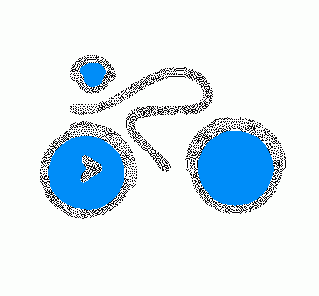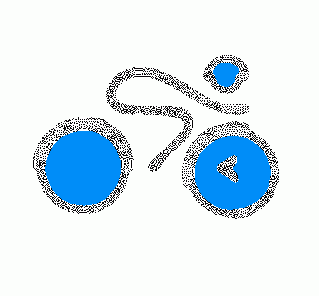| Newsletter - 2011 Archive |
 |
Cycling Club |
 |
| Newsletter - 2011 Archive |
 |
Cycling Club |
 |
Next--->
|
This was a message on the club forum in response to a new rider looking for advice. There were many responses. I thought Ben's new rider perspective might be helpful to future new riders, and that it might be more findable if we stuck it in the newsletter. So I asked Ben about it, he polished it a bit. Here it is. [EF] Advice for Newbies from a Newbie Some people who get into randonneuring are already experienced distance cyclists or are marathon runners or triathletes. When I started out, I was none of these things. The closest thing to an endurance sport I'd ever done was watching the entire Godfather trilogy in one day. A year ago, I'd never ridden 100 km before. I did two 200s last year and I'm looking forward to stepping up my distance this year. If you're an experienced endurance athlete, you might not need the following advice. If you're like I was a year ago, then you have no idea of how you're going to do this. You could ask experienced randonneurs for advice, but most of them have long ago forgotten what it's like to be new at this. I'm no expert at randonneuring, but I still vividly remember how intimidating my first brevet was, and I remember the hurdles I had to overcome. Here are my tips for newbie randos: 1. Ride the bike as much as you can. 2. Pay attention to what your body is telling you on training rides and adjust your bike set-up before you cause repetitive-stress injuries to yourself. Being exhausted and sore after a long ride is normal; having shooting pains up your legs or back is not. If you have problems like this, find a professional bike fitter who can sort your bike out. Join the randonneurs discussion group and ask for a recommendation for a good fitter in your area. 3. Find a saddle that doesn't leave you feeling like the target of the amorous advances of a herd of bull elephants. If you have a saddle that works for you, never give it up. Ride that thing until it falls apart and stops working for you. 4. Learn how to eat on long rides. It's impossible to ride 200 km without eating. I'd say that if you haven't started eating by 50 km, you're not going to make it to 150 km, but maybe that's just me. They say everyone's different in this respect, so figure out what works for you. Some people like power bars and power gels and all of those technologically advanced fake foods, and others only eat real food. Some people take the third road and eat McDonald's, which is neither real nor technologically advanced. 5. Learn how to pace yourself. You'll be surprised by how slowly some riders start out while they're warming up, only to pass you at about kilometer 60 and then finish three hours before you. <cough - Ken Bonner - cough> The tortoise and hare principal definitely applies. If you burn your legs out sprinting up hills in the first 50 km, you're in for a painful day. 6. Find someone else to train with and learn how to ride in a paceline. Drafting behind another rider can save you up to 30% of the effort it takes to propel your bike, and I've read that even riding at the front of a paceline can save you 5%. It's way easier to finish a brevet if you only have to do 70 to 95% of the work, but first you have to learn how to do it without killing yourself or your paceline mates. It's a real skill and it takes a lot of practice. There are a couple of good articles on the BC Rando website about pacelining: 7. Put fenders on your bike. You can't lead a paceline in the rain without fenders because the spray from your tire will blind the person behind you. 8. Get some luggage for your bike. On a 200 km brevet you don't need to carry all of the stuff they recommend for longer rides, but you will need to carry a few things. At the bare minimum, you'll need a pump and the tools to fix a flat tire, and you'll probably want to carry at least a light jacket, depending on the weather. A few snacks are good to have, too, but they can go in your jersey pockets, so you might be able to get away with just having a little seat bag. I'm a belt-and-suspenders kind of guy myself, so I carry a trunk bag full of snacks and tools and clothes for every season. I'd probably ride faster if I didn't, but bringing extra gear along helps me justify the money I spent on it. 9. Take your first brevet very seriously. Taper your training a week in advance. Get lots of sleep in the last couple of nights before the brevet. Carbo-load a day in advance. You'll burn about 50% more calories on a 200 km brevet than you would running a marathon. A 200 is a serious undertaking, regardless of what the crusty old veterans with their memories of PBP and the RM1200 might think of it. 10. Read tons. Ray Parker's Veloweb.ca is full of good advice, as is the club website. Check out other people's preferences for bikes and gear. Read ride reports. Half of the advice you read will contradict the other half, but if nothing else, reading will help you build enthusiasm. If you're anything like me, you'll turn into a bike geek and develop a deep, aching need for a laundry list of bikes and gear that cost three times your annual income. You'll get a subscription to Bicycle Quarterly and spend the rest of your life pining for a Rene Herse randonneuse you'll never be able to afford. If you're inclined in that direction, there's nothing that can be done. Sorry about that. That's my advice for preparing for a 200. Don't ask me how to ride anything longer because I have no idea. I'll be able to tell you all about 300s in April, hopefully.
- January 15, 2011 |